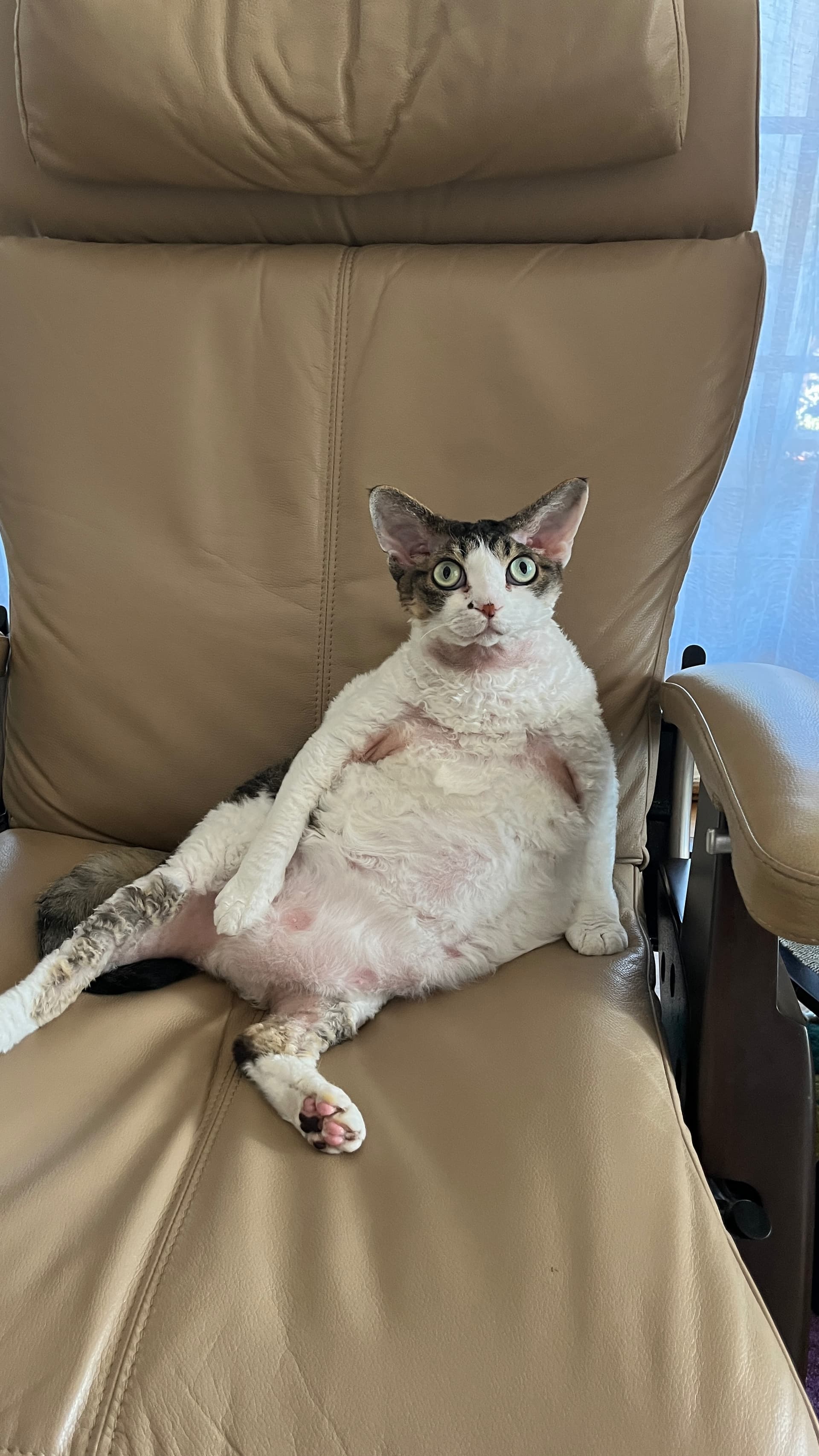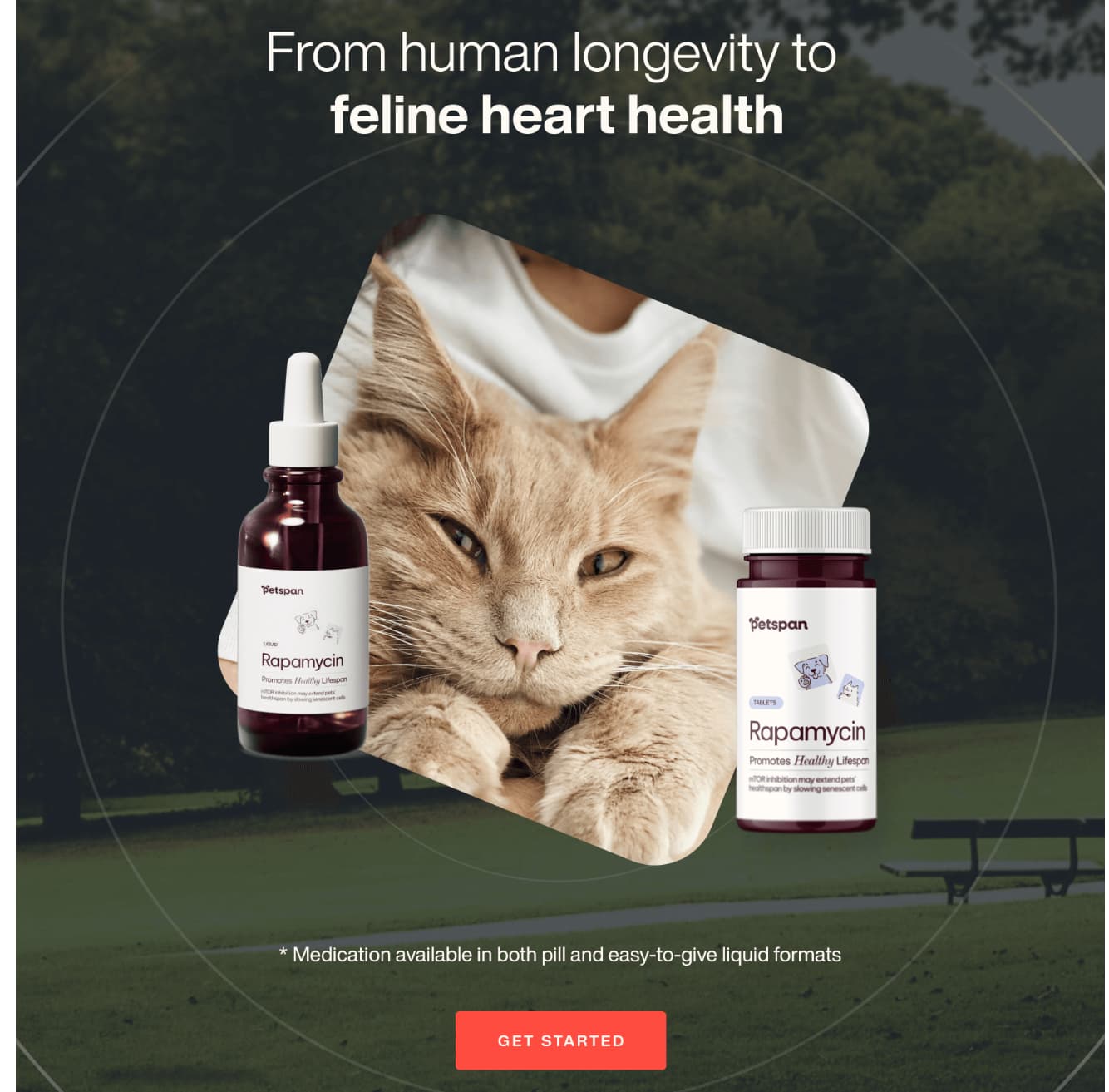I’m very happy to hear your great news!
Glad to hear, unfortunately for me my cat doesn’t seems responsive to rapamycin. What dosage do you use do you use enteric coated capsules ?
I’m giving my cat with hcm some glynac in addition now
I’m using the 0.3 mg/kg used in the cat-HCM study that showed slight improvement so for my cat about 2mg. And because I get the rapamycin through Dr. Kevin Toman who is a veterinarian, he sells an oil-based solution rapamycin which I give to my cat with a liquid syringe rather than a pill.
I will admit that my cat’s heart arrhythmia sounded like it was worsening shortly after diagnosis last year, even with the weekly oil-based dosage, so I decided to increase his dosage to 3 times a week. Because the oil-based solution is pricier than pill form, I wasn’t able to afford 3x a week of the oil so I used 2mg of Rapacan for the other two days. I did this for 5-6 months and then when back to just once weekly until I got results.
With these results I will most likely do another short-term 3x a week dosage for a few months as I found no negative side effects at that dosage even with my cat taking 3 other medications (pimobendan, sotalol, and clopidogrel).
Thanks for sharing, did you discuss with a doctor about the 3x dosage ? I’m wondering if I should try to do something similar for a few month since it evolved badly for mine despite using 1/week rapamycin at 0.3mg/kg
Unfortunately I did the 3x a week dosage on my own after extensive research. And just beware, most vets will not want to experiment outside of what dosages are being studied because they don’t want to take a risk on what they don’t know.
My reasoning for why I chose the 3x a week is because Dr. Matt Kaeberlein did a study on dogs using rapamycin 3x a week at 0.15mg/kg and saw little to no effect, good or bad. So I knew low dose 3x a week is likely safe. Then from the cat/HCM study, I know that 0.3mg/kg was safe and obviously I was already using that dose. So I just kind of combined those methods.
Just a tip if you do decide to try 3x a week is to go from 1x a week to 2x week and then wait a week or two to make sure that increasing to 2x a week isn’t causing any side effects in your cat. Every cat is different so just ease into it and if everything seems great after a couple weeks on 2x a week, then try 3x a week.
Thanks for replying, how old is your cat, what race and is it obese or just muscular (because of the weight, it’s the same as my maine coon who is really strong but not fat)
This is OT as it pertains to bexagliflozin which is an SGLT2i, but it was mentioned in the other thread. Meanwhile there are many cats that are diabetic, so I thought this might be of interest:
Safety and effectiveness of the sodium-glucose cotransporter inhibitor bexagliflozin in cats newly diagnosed with diabetes mellitus
“Bexagliflozin decreased hyperglycemia and observed clinical signs in cats newly diagnosed with DM. As a once‐daily PO medication, bexagliflozin may simplify management of DM in cats.”
@noyaux my cat is now 7 years old, he’s an Egyptian Mau, and he weighs about 12lbs with it being mostly muscle with a little fat.
Thank you for your answers I might have to do something similar with my cat
For anyone with CKD cats….
@CronosTempi Thank you again for posting this because it took me down a productive rabbit hole.
Apparently, they are looking to see if sglt2 inhibitors can help non diabetic cats with CKD, so I asked my internal medicine vet about giving it to mine. She gave me good reasons she doesn’t feel comfortable with that for them (more urine output and weight loss would be exactly what we don’t want).
However, while in that rabbit hole, I found this about AB070597. She agreed we should give it to them. Who knew it was available at Chewy!
https://www.chewy.com/aminavast-kidney-support-cat/dp/219072
I also asked her about giving my cats Akkermansia after hearing about it being good for CKD on a podcast this week. She agreed that it might be good for them.
Something that is less known for CKD cats is Chapmex/White Button mushroom extract. Here is their old website showing the studies on human renal patients:
https://web.archive.org/web/20240723201619/http://champex.co.uk/tech4.asp
I gave it to my cat with no ill effects. I also gave her drops of an extract called Kidney Support gold which has rehmania, cordyceps, astragalus, and dong quai. It seems like the research backs these supplements for renal support. I do recommend this supplement over getting them yourselves as the dose was hard to get right and it’s more palatable.
I have given it to my cat Kevin, who is almost 9 and obese. I think he seems to feel a little better in general, he has been a little more perky, a little more active and engaging with the other cats a little better. He is a challenge in terms of weight loss because of his sneaky behavior I started the rapa in order to give him additional benefits if possible.
@snowfall This is great to know because I’ve seen people online wax poetically about kidney support gold, but I assumed it was nonsense… no reason I thought this other than I tend to be skeptical… says the person who follows everyone blindly here!!
@Dreamdoc is it kidney support gold that you’ve given Kevin (love that name!) or aminavast? I assume the former? Aminavast is on it’s way now… I’ll give that for a week and then I’ll start akkermansia (if i can get this stuff in them without causing distress… I try to prioritize their quality of life vs my desire to keep them alive)
I’m giving mine 1mg of rapa each week and they are definitely perkier. 16, 17, and 18 yo. The older ones have advanced CKD and one of those also has mast cell, but they are still living their best lives.
OMG he is adorable!!! He has hair like sheep!
They did a small study on the Kidney Support Gold. It wasn’t a miracle but it did have some modest effects vs the control group. This is more than you can say for most supplements, even those for humans. This is a pretty reputable company.
Rehmannia in particular has been shown to help kidney disease, but I’ve been told to use some caution regarding studies on traditional Chinese medicine:
This hit my inbox from Gethealthspan.com. When
They offer rapa for dogs and cats in liquid and pill form.
They mention the pills are delayed release, but aren’t our human pills the same? @RapAdmin? Meaning, these pills are only valuable for those who don’t already have access to them, correct?
But the game changer here for many is they offer it in liquid form. I don’t understand how that is effective based on everything we’ve heard, but I’m imagine they’ve tested it and it works.
When you click on the link, you are taken to Petspan. You have to give them too much information just to get the price, so I have not done that (my short attention span self finds that annoying)
@rthr thought you’d find the liquid interesting, even if you don’t have access to it at this time
Thank you Beth
My dog cannot tolerate pilling him at all hahaha. I could only trick him to take meds.
And about liquid rapamycin, Pfizer has a 1mg/ml Oral Solution, and Pfizer recommends the same dosage for coated tablets and liquid form.
The liquid form of rapa is mix in ethanol & propylene glycol & soya oil.
So I think it is also effective to take rapa in powder (mix in oil maybe), and it only need just a very little bit higher dose.
Hi! my cat was recently diagnosed with HCM stage C. how is your cat doing?
If your cat has HCM, I would definitely start them on rapa, as you’ve obviously read.
I don’t bring my cats to the cardiologists for follow ups because at their old age I’m choosing their quality of life over info, but mine are doing great on it… definitely more energetic.

